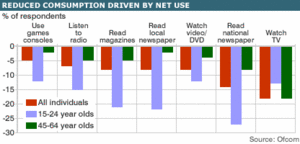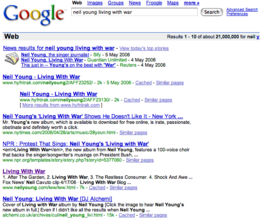16 August 02006
Trends and substitution between media platforms
Tell me if I'm misinterpreting this graph (based on an Ofcom report, via a BBC news story), but I think it's saying that the time young people spend on the net comes particularly at the expense of time they might otherwise have spent on print media (magazines, local and national newspapers).  Conversely the time middle-aged people spend on the net is being subtracted most from the time they used to spend on television.
Conversely the time middle-aged people spend on the net is being subtracted most from the time they used to spend on television.
Put another way, could you say that TV retains some appeal to younger people while the middle-aged are turning it off. And they are still using print to a fair degree, a habit which many 15-24 year olds today have possibly never developed.
Continue reading "Trends and substitution between media platforms"13 August 02006
Third year web site charts

This is my annual round-up of the most commonly accessed pages on this site and the most common search terms that lead people to it. I do it every August, partly because it seems like a slow month, and partly to mark the anniversary of the site. Here are the equivalent charts for the first year and the second.
Here are the charts for this year. They are based just on the last six months, because that's how far my web logs go back.
The dominance of Neil Young in these charts requires some explanation. This comes down to the apparent vagaries of Google. In the week that Young's Living With War album was released, my posting about it was in Google's top six results for the search term "neil young living with war", outranking Young's own official blog (click the thumbnail to the right to see a larger version).
Continue reading "Third year web site charts"7 August 02006
Playlist services: Mixlister review and FIQL re-vamp
A couple of updates about playlist services.
Cloudbrain contacted me last month to let me know about about Mixlister, their new playlist sharing service. This comes at a time when GoFish has withdrawn from playlist services, FIQL and MyStrands are enhancing their offerings, and some others (e.g. Upto11) appear to have remained unchanged for the best part of a year.
Continue reading "Playlist services: Mixlister review and FIQL re-vamp"3 August 02006
Knowledge, power and mobilising a lobby through Wikipedia
Last night I added my tuppence worth to Wikipedia's entry on the History of Virtual Learning Environments. As manager of an online learning consortium in the late nineties, I helped the software company Fretwell-Downing Education build a pilot web-based Virtual Learning Environment (VLE). Though you would not know it from the entry as it stands at the time of writing, the description I've added of this case study — and the catalogue of others being collected in the Wikipedia entry — are not there just to add to the store of the world's knowledge: they are there to prove a point.
Last week the e-learning systems company Blackboard announced that it had been issued a patent (in the US) covering a number of software features that have been standard components of VLEs for several years. This quickly had several e-learning bloggers up in arms: I found out about it from Jay Cross and Seb Schmoller; and Stephen Downes has a good round-up as usual.
I share the widespread contempt for this development, and the disrepute that it brings on the ethos of patents. That's why I was more than happy to add my contribution to the Wikipedia entry to demonstrate the 'prior art', which could invalidate the patent by showing that the claimed invention was in public use prior to the date of the patent filing. Nevertheless I can't help feeling slightly uneasy about this politically and commercially motivated use of Wikipedia.
Continue reading "Knowledge, power and mobilising a lobby through Wikipedia"
Subscribe to my RSS feed, which covers this blog, my book blog, and further commentary on other web resources (more feeds below)
Third year web site charts
Playlist services: Mixlister review and FIQL re-vamp
Knowledge, power and mobilising a lobby through Wikipedia
Cinema (24)
Cultural Calendar (86)
Curatorial (66)
E-learning (102)
Events (35)
Future of Music (95)
Human-Computer Interaction (62)
Ideas and Essays (37)
Long Now (18)
Miscellany (44)
Music and Multimedia (157)
Playlists (27)
Podcasting (12)
Politics (12)
Radio (48)
Reviews (58)
Social Software (60)
Teaching (23)
Alternatively, see the Date-based Archives
Recommended: RSS feed that combines items on this site, my book blog, and commentary on other web resources
RSS feed for this site only
RSS feed for my book, Net, Blogs and Rock'n'Roll
RSS feed for shared bookmarks
My latest bookmarks (click 'read more' for commentary):
My archived bookmarks (02004-02008)
On most social sites I am either 'davidjennings' or 'djalchemi', for example: Flickr, Last.fm, Ma.gnolia and so on…
Lateral Action — managing creativity
Herd — social cognition
Seb Schmoller's e-learning mailings
Viridian Design Movement
Tom Phillips — artist
Long Now blog — resources for long-term thinking
Longplayer live stream — 1,000-year composition

The contents of this site are licensed under a Creative Commons Licence except where otherwise notified.
Hosted by Paul Makepeace
W3C Standards
Check whether this page is valid XHTML 1.0
Check whether the CSS (style sheet) is valid

